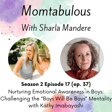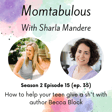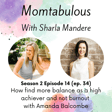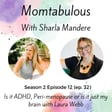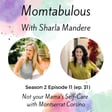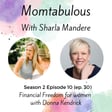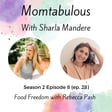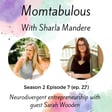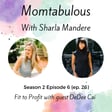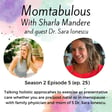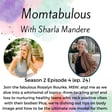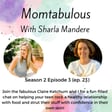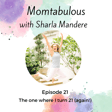Become a Creator today!Start creating today - Share your story with the world!
Start for free
00:00:00
00:00:01

"Hot" Mom(tabulous) Summer
Perimoenopause can take it's toll on you! I've recently made the transition to lower impact workouts and it's made a huge difference! Here is one thing that I've been doing, what the research says, and how you can have a Hot Momtabulous Summer - even when you're a perimenopausal hot (and how this might even help that too!)
Transcript
Introduction to Perimenopausal Journeys
00:00:01
Speaker
Hello and welcome back to another episode of Mom Tabulous. I am Charla Mandare. And today, you know, we're going to talk a little bit about this perimenopausal, menopausal journey that I know I've started on, a bunch of my friends are on, and it's been a bit mind boggling and I'm starting to figure some things out.
Charla's Passion for Research and Fitness
00:00:23
Speaker
And you know, if you know anything about me,
00:00:25
Speaker
I go to the table. I kind of geek out on research and I love learning about things and why and why certain things happen and just why our bodies do what they do. It's helped me as a fitness trainer. It's helped me as a health coach and it's helped me to coach women for the last decade on how to help them get the results that they want with their body, right?
00:00:54
Speaker
And in that, you know, it's also helped me help my kids with their school projects. I'm like, ooh, you're doing a project on England. Great. I lived there for four months and let's research this. Let's look at ABCD and then, oh, ooh, that's fun. Let's look more into that. Like I kind of, I didn't geek out on that in school when I was in school, right? But now as an adult, I do. So I love going to the table, researching, constantly learning,
00:01:22
Speaker
And I'm constantly taking classes and I'm constantly listening to other podcasts and researching everything.
High-Intensity Workouts and Lifestyle Challenges
00:01:28
Speaker
So, you know, let's talk about this hot mom summer, hot mom on many levels, right? One hot mom summer, cause you know, we'll just be hot moms wherever we are. We'll just be hot moms, but also hot flashes.
00:01:45
Speaker
Let's talk about it, right? Hot mom summer on many different levels. Okay. Well, one thing that I've been doing, I just want to talk about one thing today because I'm trying to keep these very short, right?
00:02:00
Speaker
is I, if you know anything about me, I love bootcampy workouts. I am the fitness trainer that will yell at you. I teach spin classes. I ran for a long time. Now my knees don't love it anymore, but I ran for a long time. I've run half marathons. I bootcamp you. I don't want to say I bootcamp you to death because that would be a really bad thing.
00:02:27
Speaker
But I love that. I get the energy from it. When I work out, I want to feel like I might pass out or die or puke or something. Right. Like I prided myself on that for a long, long time. What I've learned because this year in particular and I'm 47, I'm about to I'm 48 and less than a month at this point in filming this. And, you know, for a few years looking back, I've had some some menopausal symptoms going on. But this year in particular, I feel like I blinked and 15 pounds came on.
00:02:58
Speaker
I blinked and I was like, whoa, what? How? I thought that is not what I looked like yesterday. How? What? Why? And the scale was like, whoa, my God, where did that come from? And granted, there have been some choices that I have made that I'm getting more under quote unquote under control. I don't like that term because I am recovered from an eating disorder. Um, so I don't, I don't like to talk about control with food, but I feel like
00:03:28
Speaker
You know, I lost both my parents two years apart and there became this attitude for me of F it. Life is short. You don't know when it's going to happen. Both my parents were really fast. Didn't get a goodbye. Um, maybe that's a podcast for another day. If you don't know that part of my story, but I really kind of did get into, if I want the wine, I'm going to have the wine. If I want the chips, I'm going to have the chips. If I want the cake, I'm going to eat the cake.
00:03:57
Speaker
effort, right? Who cares? Because who the heck knows how much longer, you know, what longer
Impact of Perimenopause on Health
00:04:04
Speaker
we have. And I just kind of started to spiral in that. And, you know, and when you live in the land of effort, for a good long period of time, that weight will come on, not only the weight, but lower energy, inflammation, puffiness in my face, waking up, my eyes were really dry, right? That kind of stuff that
00:04:24
Speaker
shoulder pain and then add perimenopause into the mix. And my body was like, stop. And I got tired of not feeling good. So I decided, again, I made a decision. A lot of this just comes from making a decision, but I made a decision that whatever time I have left, hopefully it's another 45, 50 years, but whatever time I left, I am going to feel good, right? I'm going to feel good. So one thing that I've started doing is scaling my workouts back.
00:04:53
Speaker
going from the boot campy and I still teach spin. I do. I love the loud music and the lights are down and I'm on the mic and I'm like, go for sprints and we're pushing through hills and all of that. I do love that. But when I'm working out for myself, I don't do that anymore. My husband's like, we have a very expensive bike sitting right there and
00:05:17
Speaker
Could you get on it again? Because we paid for it. And he's not like, can you get on it for how you look, right? That's not at all. It's more just like, you got to use the thing that we paid all this money for. And I do every once in a while. But I'll ride leisurely. I don't get on and push myself for it. What I started doing is walking. Super simple. Because anyone can do
Critique of Male-Centric Fitness Research
00:05:39
Speaker
this. Pretty much anyone can do this, right? So I want to talk today about people go, what is the magic between of like 10,000 steps?
00:05:47
Speaker
Should I wear a weighted fit? There's all this stuff now coming out, research, all of the fitness research. I'm going to say this before I get into this. The fitness research that we've had for the last 30, 40 years is all based on a man's body. So if you are a woman, every magazine, everything you've heard, you got to throw it out the window. And the reason they didn't research women's bodies is quite honestly, we're just too complicated. We have hormones. Men have a 24 hour circadian cycle. Women have a 28 day.
00:06:17
Speaker
cycle. Okay. So for a, you know, quite honestly, a male scientist sitting in an office like, what am I going to spend all that time for? I'm gonna, I'm literally gonna just research a man's body and tell you how much weight, when to superset, when you should be doing cardio, how many days a week of cardio, what you should be eating, how much protein you should be getting, how much fiber, what a healthy fat is for you, how much healthy fat. And you just listen to that, but it's all based on a man's body. So when women come to me and they go, I can't
00:06:47
Speaker
Lose weight, I'm tired, I don't feel good, I got inflammation. I'm going, what are you doing? And they're following all of these rules that we've been told are good, but they're for men's bodies, not women's. And specifically, not for perimenopausal and menopausal women's bodies. Because at that point, we change. When we get pregnant, it changes. Postpartum is different. When you're pregnant, you should be eating more, and then postpartum, you gotta be eating, if you're breastfeeding, making the milk, you gotta be, there is so many variables.
00:07:15
Speaker
that start not just when a girl hits puberty, but even before. I've had conversations with my children's coaches of female athletes and what these girls need to not be doing at certain times of the month because this is when they're actually getting injured more. There are so many variables. So trying to keep this short.
00:07:37
Speaker
Like this episode could be four hours long and I could tell you everything. But I do walk women through this, so there are programs that I offer and you are welcome to come and join me and get even more research on this
Health Benefits of Movement
00:07:48
Speaker
from me. But there's magic in the 10,000 steps a day. Now is 10,000 the be all end all? No. If you are a person that sits the majority of the day and you're getting about 3,000 to 4,000 steps in a day, I'm not going to tell you to jump up to 10,000 steps all at once. Boom. Okay. We're going to talk about that.
00:08:05
Speaker
for average a goal of 10,000 steps a day for women, and you can track it on a watch, right? Whatever, your phone, your watch, something. The reason is 10,000 steps a day, we do reduce our risk of cardiovascular disease by 20%. And if you have heard this research, as women get into menopause, cardiovascular disease goes up.
00:08:32
Speaker
So we want to reduce that risk and we can reduce that risk by simply walking more. Okay, we're just talking about getting more movement in.
00:08:39
Speaker
parking your car farther away and all these things that I heard my mom talk about when I was a teenager and I was like, why are we parking the car all the way in the back of the parking lot of the mall? I just parked up front and she was like, no, it's better to walk for park farther away and walk. And I said, we're walking around the mall. Why are we this, this, this, this stuff has been around since like the eighties, right? So part all of that, taking the stairs instead of the elevator. If you're not going up 27 flights, you know, whatever be my guest, right? But okay. Um, you know, walking around the block.
00:09:09
Speaker
If we're talking about productivity, I've done work with Brendan Burchard and he's a high productivity coach He he has said years ago that The highest level like billionaires like we're talking like the Richard Branson's and the Oprah's and all of that Set a timer and take a break every hour on average between It was five and 18 minutes now, of course, that's including like a lunch break, right? No one's taking an 18 minute every break every hour but on average
00:09:39
Speaker
a five to 18 minute break every hour. They set a timer, if they're in an email and they're in the middle of a sentence, they get up and they move their body when that timer goes off. They're that disciplined. And I think we need to take the average Joe's, average Jessica's here, right? Need to take a little bit from that and take some of that discipline, right? So every hour, make it a point to stand up and move your body. You need to do a shakeout,
00:10:07
Speaker
Get up, walk into the kitchen, get some water, go to the bathroom, grab a snack, not in the bathroom, but you don't understand what I'm saying, right? And then move your body around. Maybe you walk around the block. Maybe if you work in a corporate office, you go outside and you walk. I used to work in this corporate office. I had this pretty garden. I could walk around the garden and go back in, right? A, you'll get more energy. B, you'll actually be more productive because you've taken a break.
00:10:33
Speaker
When we take those breaks, we come back, we're refreshed, we're more productive. They come back, they finish the email, boom, they move on with their day. So the 10,000 steps also helps reduce the onset severity of illnesses like certain cancers, stroke, and heart failure.
Walking for Mood and Health
00:10:54
Speaker
It helps our mental health.
00:10:58
Speaker
It helps us to be happier. It's a mood boost, right? When we move our body, the endorphins start flowing. We know that the exercise endorphins, the blood starts flowing. When the blood is flowing, we instantly feel happier. So if you're like in struggle and you're sitting and you're struggling through, okay, we need to, we need to get out. We need to move our body. I do this with my kids. Maybe you do it with your kids. You take a dance break or something, right? It reduces anxiety. It reduces depression and our mental clarity increases our mental clarity and
00:11:28
Speaker
can reduce dementia. My grandma had dementia, and I don't want to have that. So if there's anything that I can do, if walking can reduce the risk of dementia, then I'm going to do it. Bonus.
00:11:47
Speaker
By the way, walking is free. You don't have to pay for a gym. You don't have to do anything. It's free.
Using a Weighted Vest for Enhanced Fitness
00:11:52
Speaker
You go out and you just walk. You stand up and you move your feet, right? It also helps to increase our focus. Now, something that I've been doing in addition to walks, and again, I would say work your way up to this, is I've been walking with a weighted vest. So now weighted vest, no, not for all 10,000 steps a day, right? When I go on like a daily walk, I will put on a weighted vest. This weighted vest, there's certain,
00:12:16
Speaker
parameters around how heavy you want it to be. I go through all that in my programs, but overall and what I noticed, I just led a 14 day walking challenge where we walked every day for 14 days and was the goal 10,000 steps. Some people made it their goal. The goal was just to increase the movement and to walk every day for 14 days. I got a notification on my phone that said my overall heart rate was increased for those 14 days. Great.
00:12:45
Speaker
That means I got more movement in, right? It's not that I was over here like having heart attacks every day, right? But my overall heart rate was increased even over the workouts that I had been doing because I was doing more movement. Okay. Which means more calorie burn, which means higher metabolism, which means weight loss, which means muscle build, which means body composition changes, right? So if that's something, that's your goal. That's something you want to do.
00:13:13
Speaker
walking and moving more and adding that weighted vest. But also, again, the mood boost. I felt really good for those 14 days, so I keep doing it. If you don't have a weighted vest and you're not ready for that yet, you can get ankle weights. They're usually about one and a half to two pounds each. Put one on each wrist. Put one around your ankle. Walk with them on your ankle, put them on your wrist.
00:13:38
Speaker
You could even flop them over your shoulder if you don't velcro them close, just flop them over your shoulders. You've got three pounds on your back, right? But walking with the weighted vest, what it specifically does for women in perimenopause and menopause is that it's gonna help us with our bone density, okay? And what decreases as we get older? We all know this, bone density. That's a higher risk for falls, for breaks. Our core is working harder with the weighted vest because it's added weights to keep us upright.
00:14:08
Speaker
Strong core helps us to reduce the risk of falling, right? As we get older, the risk of falling goes up. Specifically with the bone density, it helps with our hips, our legs, our hip and ankle stability, and it helps the bone density in our spine.
00:14:25
Speaker
So again, you want to be standing up tall, you want your posture. I notice my posture is much better when I'm walking with a weighted vest because if I hunch forward, it hurts a little more, right? So I've got to make sure my shoulders are rolled down and back. It's helping my posture as I get older, but that bone density in the spine, in the hips, the ankle stability, the hip stability, okay? It's going to help us. All of this is reducing the risk of falls and then increasing the bone density so that should somebody fall,
00:14:55
Speaker
there's less chance of breakage. Okay. Nobody wants to be that older person that falls and breaks the hip. And then you've got to have the hip surgery and then it's not good after that. Okay. Um, but it also increases the intensity to give us more variables in the workout.
00:15:14
Speaker
which is what we want to do. We want to keep shocking the body. We want to keep the body guessing, right? So I'm going from spin on a bike to walking with a weighted vest. My body was, whoa, hey, wait a minute. This is totally different. Guess what I'm going to do. I'm going to adapt. I'm going to increase the metabolism. I've got to, I've got to build the muscle here. So everything starts to change.
00:15:35
Speaker
And that's what we want to do. We just want to keep the body guessing. We want to keep those variables coming. So some days you walk with a vest, some days you walk without, some days maybe you go take a strength class. This is not replacing strength training. By the way, this is in addition to walking at night after dinner will help your digestion. So guess what that does? When our body doesn't have to work so hard to digest food, we reduce inflammation and we can lose weight easier. Okay. All right. Also,
00:16:03
Speaker
Walking with a weighted vest increases your mental focus and endurance. And I don't know about you, but as I get older, my ADHD is popping off like a queen and I'm like back down ADHD. So the mental focus, because when you do something that's different and hard, your mind has to get in the game.
00:16:24
Speaker
in a different way, right? Whether you notice it or not, you're minus to get in the game in a different way. So this is all just the ways to help us. Um, increases our metabolism and our calorie burn by 10 to 15% more when you wear a weighted vest. So how about that? All you're doing is walking at a weighted vest. Calorie burn goes up by 10 to 15%. That means you have to walk as long.
00:16:46
Speaker
Or if you're walking for 30 minutes and then you add a weighted vest for 30 minutes, you're burning 10 to 15% more calories in that 30 minutes. It's like doing a 45 minute walk instead of 30. So think about that, okay? Here's my tips, right? Start small. Don't try to go from 3,000 steps a day to 10,000 steps a day, okay? Go from 3,000 to 4,000 and then get used to that. And then, right?
00:17:13
Speaker
challenging yourself out of your comfort zone by little bits, by little bits. Challenge, you know, start small and work your way up in time, but also in distance and in terms of a weighted vest. I have a friend that I walk with, our kids have this math tutoring. We've been walking every Monday and it's kind of hilly. We're in Hills around San Diego and it's kind of hilly. And you know, first I had angle weights cause I didn't have a vest and I was like, do you want to carry the weights? And she was like, no, I'm good. I'm good at just walk. You're, you're,
00:17:42
Speaker
fun with the weights. That's cute. And I was like, okay, great. And then, and then one day she was like, I have ankle weights at home. And she started holding ankle weights. And then I got a weighted vest. And I was like, you know, this isn't as bad as I thought it was going to be. I totally doable. And I was wearing a sweater one day. This is weeks.
Challenging Workouts and Adaptation
00:18:01
Speaker
This is weeks. And I'm very condensing this. And I was like, I need to take the sweater off. I'm hot, starting to get sunny and warm in San Diego. So I'm hot.
00:18:09
Speaker
And I said, can you hold this vest for me while I take off my sweater? And she was like, sure. And she put it on. And then I took my sweater, I tied it around my waist and she kept wearing the weighted. I didn't ask for it back. This is the kind of friend I am. I will push you, right? I didn't ask for it back. I didn't say anything. I didn't ask for it back. And she walked for like 10 minutes and she goes, did you want this back? I was like,
00:18:32
Speaker
Well, how do you feel? Like, do you want, you know, what do you want? And she, she gave back to me, which was fine. I'm happy to take it, take my weighted vest back, but she went and I was ready to go up and wait in the weighted vest. She bought that one off of me. Okay. So take a friend, challenge a friend, work your way out to it, inspire each other and keep, keep challenging yourself in the workouts. Find what's just outside your comfort zone, right? Cause that's how we increase everything.
00:18:59
Speaker
If we keep doing the same thing every day, not only do we get bored, but your body gets bored. Your body gets used to it. Your body gets stagnant. Your body gets stale. Your body goes up and they're done that. And it doesn't need to keep adapting. We've got to keep the body adapting. So vest, no vest. Don't forget to strength train. The bone density, the muscles, we need our muscles. As we get older, we need our muscles. So strength training is everything.
Strength Training Importance
00:19:25
Speaker
I strength train four to five days a week, and then I walk.
00:19:29
Speaker
My goal is right now four to five days a week walking. Okay. Walking extra. So I am doing some movement every day. I've started taking a handstand class on Sundays at the gym where my daughter does aerial silks because it's something different. I used to be able to do handstands when I was like in college and high school and I obviously cannot do a handstand now. And so I'm like, I'm going to get this back and it's something different.
00:19:59
Speaker
And it's zone one or two intensity. Okay. And we're looking at heart rate zones. Zone one is where we live most of the day. Zone two, your heart rate is going up. It's, I think I did a whole episode on this earlier, but heart rate is starting to come up. You can do the talk test. If you can talk a sentence, but you're a little bit winded.
00:20:19
Speaker
And then zone three is where you're like huffing and puffing. You can get out a word or two words and that's it. And it's, that is not sustainable for long periods of time. Zone three is the push in the high intensity interval training, right? Pari-menopausal menopausal women want to keep it zone two. So the strength training, the walking, walking with the best, maybe going on hills, going up and down stairs, that kind of stuff is going to be your zone two. And that's the magic. So ladies, here's, here's, here's what we're going to do.
00:20:49
Speaker
Pick one. Here's your homework. Pick one. Move your body. Walk. Go for a 10-minute walk. Take a break every hour. Move your body. Or if you're already doing all of that, maybe add some weight. Get a weighted vest. Contact me. I've got links. I'll share with you the one that I wear. It's fine.
Social Media and Walking Challenges
00:21:10
Speaker
And then pick one. And then keep challenging yourself. I would love to hear if this has just helped kind of
00:21:19
Speaker
clarify some of this research for you because all of this is new. There is so much research around women's hormones right now that women are doing. We want research by women. That's what we want research by women. So we're doing it. We're doing it. And, and I'm researching too. That 14 day walking challenge that I led was a research based beta test for me.
00:21:44
Speaker
So I'm gonna be doing more of those. I'm gonna be changing it up a little bit, right? So it's not the same thing every time. Different people can, or the same people can do them all and they'll get something different from it each time, but also different people can join and still get a lot out of it. And we're gonna be moving our body more and more. So look for more of those coming. If you don't follow me on social, charlamandare.happy at Instagram. That's where I do most of my stuff. I have a TikTok, I think it's just my name.
00:22:13
Speaker
And there's a Facebook page. I don't really use a lot because it doesn't send out to anyone really. I don't know. Facebook algorithms are weird. So, um, Charlotte Mander dot happy on Instagram is probably the easiest place to follow me and get all the information of when I'll be leading another one, which will be soon because we got summer coming.
Motivational Conclusion
00:22:33
Speaker
So let's, let's move our bodies and keep it guessing because that's how we get through perimenopause and menopause journey safely.
00:22:43
Speaker
healthy, happy, and we're gonna balance these hormones. All right, zone two, that's the goal. That's the goal. If you are a bootcampy person like me, scale it back for a bit. And we've got this, we've got this hot mom summer. All right, I'll see you in the next episode.

